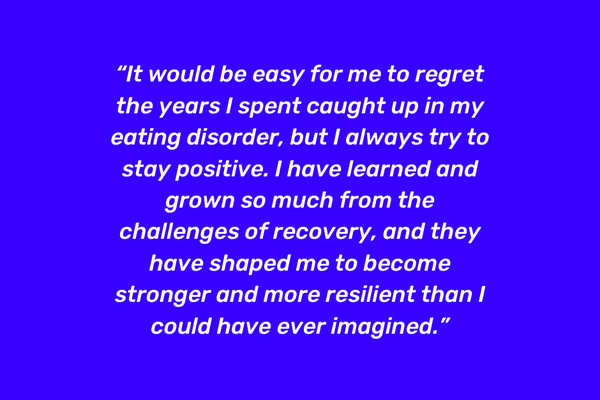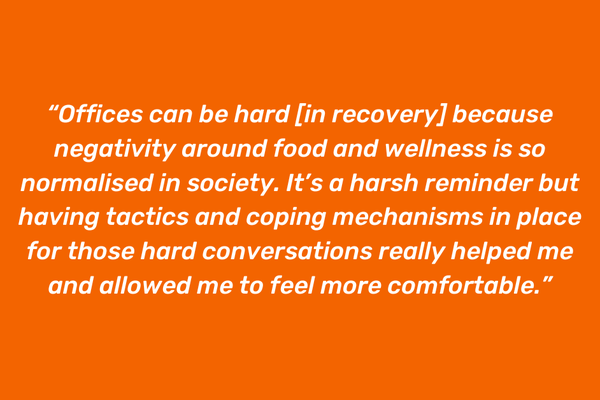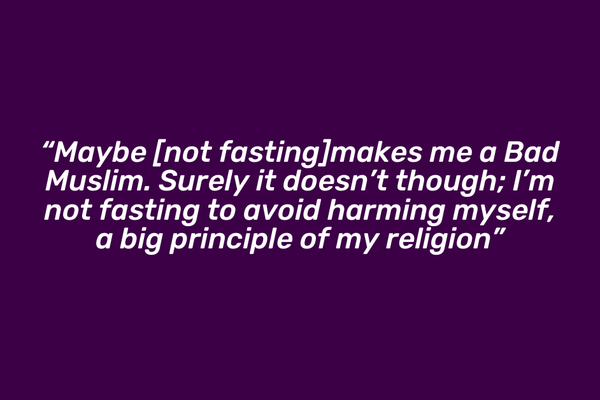Throughout the years I had dealt with an eating disorder, I kept multiple journals and diaries. At the time, they were meant to be written for all aspects of my life, and not just the negatives but the positives too. I’d write lists of things I wanted to do, goals, and how I felt that day. I read them back recently, and was surprised to see that pretty much 98% of my entries were centred on all things food. That speaks volumes about how consumed I was by this illness. I didn’t know it at the time, which made reading this really quite sad.
People from my past often tell me they’re surprised by how I am now. How much more confident I am, more social, and on the whole, different. Of course we change as we get older; nobody is the same as they were in school. But the truth is, I’m leaps and bounds different from my past self because that person was not me. That person was unwell, was tired all the time, unfocused, nervous, and quite frankly, hiding inside a massive shell.
I had no space in my brain for other things in my life. Food was the priority. It took up all my time, all my energy. It’s not until you’re in recovery, or recovered, that you see all of this from an outside perspective, and realise how poorly you have treated yourself over that time. It feels like an out of body experience. All in all, the biggest thing that this part of my life has taught me, and something I feel many disregard, is that eating disorders are just as bad on your mental health as your physical health. The two go hand in hand.
I was worried deep down that no one would believe me. At points I almost wanted to ‘prove’ to myself and my loved ones that I had a problem. This was the voice in my head encouraging me to continue restricting. My biggest fear was letting go of the eating disorder. I wanted to keep that control, no matter how miserable it made me. They say you need to let go of control to gain control, and this is absolutely true, but it isn’t that easy.
One thing I wish I knew during recovery is that slipping up doesn’t mean you’ve failed. Breaking the cycle is extremely difficult to do, and can sometimes feel like it’s going to go on forever, but it won’t. Picking yourself back up after a slip is a massive sign of strength. You’re not going backwards. If anything, you are going forwards. You are learning about your triggers. You are figuring out what you need to do. Recovery is not linear, and you can try again, as much as you need.
You may find yourself wondering if it is worth holding onto this control, and you likely know full well that life would be so much better without this illness, but even with all that information, it can be so hard to let go. An eating disorder feels like your whole world, when really, there’s a whole life outside it that you get to live. New adventures, new possibilities, and most of all, a new version of yourself that has been waiting to blossom.
Recovery will be worth it. It’ll be a tough road, but you are so loved, so supported and so strong. Keep on fighting, and you’ll see that light at the end of the tunnel, and you’ll be able to live life to the fullest. I believe in you.
Contributed by Ella
If you've been affected by any of the issues raised in this story, or are concerned for yourself or a loved one, you can find support and guidance on the help pages of our website.
Help us change lives
Donate today to help us provide more vital support to people like Ella.
Finding me again in eating disorder recovery - Georgia’s story
30 January 2025Rebuilding your identity in recovery can be daunting - here I share some tips that helped me find the old and new me in recovery
Tackling the office with an eating disorder - Sophie's tips
22 April 2024Our supporter Sophie shares her tips on how to navigate the office while in recovery.
"I used to fast for all the wrong reasons" - Ayisha's Ramadan recovery story
11 March 2024Our supporter Ayisha explores her experiences of navigating Ramadan while in recovery from her eating disorder


